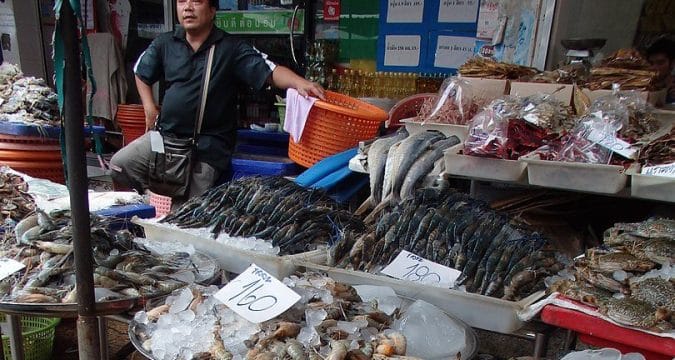
James Lovelock, Bangkok
An alarming spike in Covid-19 cooronavirus (SARS-CoV-2) infections among migrants from Myanmar working in a central Thai province could lead to further discrimination against underprivileged foreign labourers.
It’s not as if there isn’t already enough discrimination targeted at migrants in Thailand as it is. They are often treated poorly as they lead lives of grueling toil and ceaseless penury.
At issue is an announcement made on 19 December 2020 by Thailand’s Centre for Covid-19 Situation Administration (CCSA) that 548 new cases of infection were recorded in a single day in the coastal province of Samut Sakhon, which lies west of Bangkok and is a major hub of the Thai fishing industry.
Within a day another 200 new cases were documented and the virus was found to have spread to several nearby provinces, including Bangkok. “We expect many more cases,” a senior government official announced on December 20.
The vast majority of the newly infected have so far been migrant workers from Myanmar who work at or near a large shrimp market, although some 90 per cent of them remain asymptomatic, according to the CCSA.
The spread of Covid-19 in the province came to light last week when an elderly seafood vendor at its central shrimp market became sick and sought treatment at a hospital, where she was found to be Covid-19 positive. A subsequent mass testing at the market showed that nearly 550 people in all were carrying the virus.
The spread of Covid-19 in the province came to light last week when an elderly seafood vendor at its central shrimp market became sick and sought treatment at a hospital, where she was found to be Covid-19 positive. A subsequent mass testing at the market showed that nearly 550 people in all were carrying the virus.
The scale of the new infections in Samut Sakhon has caused alarm in a country where previously there had been no significant local spread of the disease since March and the total of known infections all year stood at slightly over 4,200. By contrast, neighbouring Myanmar has seen more than 115,000 cases.
Thailand’s Public Health minister, Anutin Charnvirakul, pointed a finger at migrant workers claiming the source of the renewed outbreak “likely migrant workers.”
A construction magnate with little experience in medicine, Anutin earlier in 2020 accused Western tourists—without evidence—of bringing Covid-19 to Thailand. This time around he has suggested that migrants from Myanmar brought the virus into the country by evading mandatory quarantine upon entry.
It remains to be determined whether migrant workers from Myanmar are indeed the source of the new outbreak in Thailand. What is hardly in doubt, however, is that even if they indeed were, they would have been unwitting spreaders.
In Thailand’s intensely hierarchical society, impoverished migrant workers from neighbouring countries, whose economies pale in comparison with Thailand’s, are at the bottom of the heap. They are subject to routine maltreatment at the hands of employers, especially in poorly regulated industries such as fishing.
Numerous Myanmese migrant workers, many of them underaged, labour in gruelling circumstances in Thailand’s fishing industry for minimal wages. They do so in unhygienic conditions that many labour rights advocates describe as a form of modern-day slavery.
Pathogens can easily spread among these underprivileged workers as their access to quality health care is limited. Thailand’s Disease Control Department has sought to allay widespread fears by stressing that the effect of the new infections “will be minimal as the infections have occurred in young and strong migrant workers.”
Yet foreign migrant workers could end up suffering from another malady: social ostracism.
In Thailand’s intensely hierarchical society, impoverished migrant workers from neighbouring countries, whose economies pale in comparison with Thailand’s, are at the bottom of the heap. They are subject to routine maltreatment at the hands of employers, especially in poorly regulated industries such as fishing.
“There have been several reports of abuse and exploitation on board Thai fishing vessels in recent years (including) cases of forced labour and trafficking reported in the media,” the International Labour Organisation explained in a report.
“However, the scale of the problem has been hard to assess due to the challenges of conducting research in this area, including the nature of fishing work and, in some cases, the clandestine means used to exploit fishers,” the report said.
According to a July report by the World Health Organisation, the estimated 400,000 migrants working in Samut Sakhon’s fishing industry have adequate access to effective health care.
“Everyone has equal access to Covid-19 treatment and support regardless of their legal status,” Supoj Suakham, head of the Disease Control Department in Samut Sakhon, told the agency.
“Everyone has equal access to Covid-19 treatment and support regardless of their legal status,” Supoj Suakham, head of the Disease Control Department in Samut Sakhon, told the agency.
There are legitimate concerns, however, that migrant workers at large might now find themselves maltreated and shunned. They might also lose their jobs, which would mean further hardship for people already down on their luck.
On social media, xenophobic sentiments directed at migrants from Myanmar appear to be on the increase in the wake of the flare-up in infections.
“Do people here actually believe that migrants are not a risk factor when it comes to Covid infections?” one commenter argued, adding, “You think there isn’t massive illegal immigration from a country (Myanmar) where Covid rages unchecked?”
Migrants, especially those from Myanmar and Cambodia, have long been convenient scapegoats for crimes probably committed by Thais. Blaming migrant workers now for Thailand’s problems with Covid-19 won’t do anyone any good.
Then again, there are many Thais who aren’t blaming Myanmese migrants. Instead, in trending social media posts, they are pointing a finger at Anutin and calling on him to resign.
The views expressed in this article are those of the author and do not necessarily reflect the official editorial position of UCA News.








